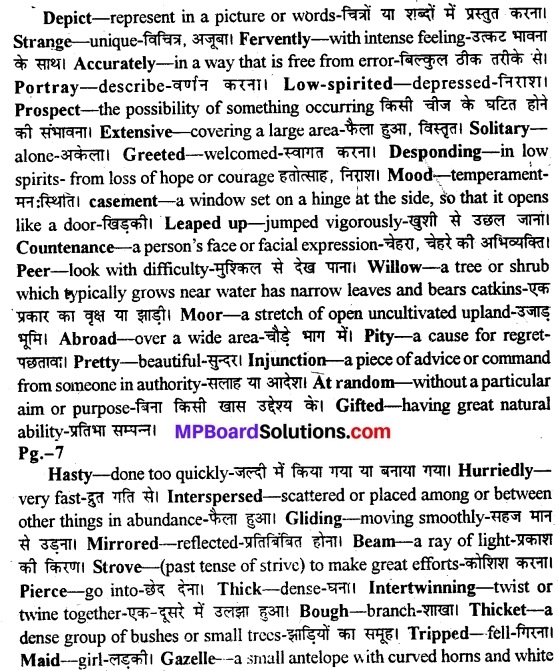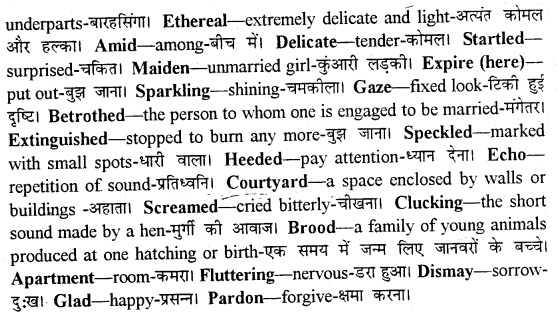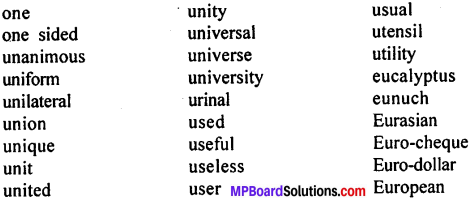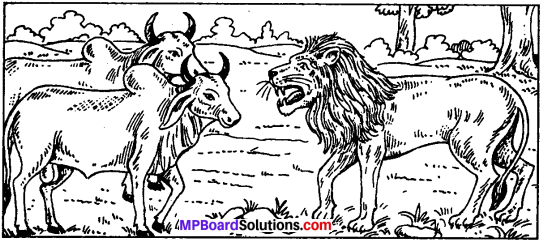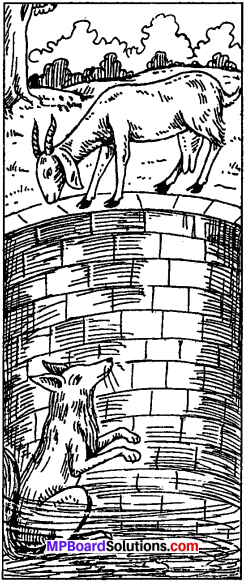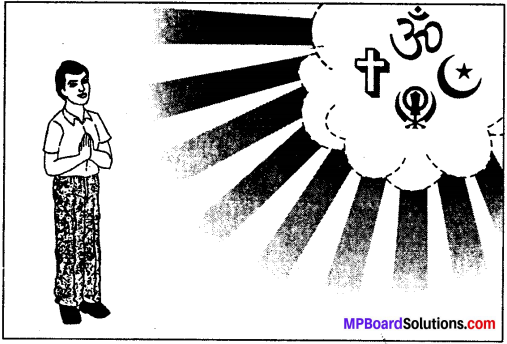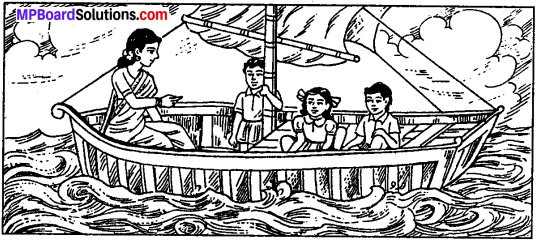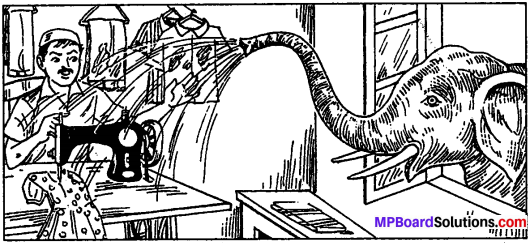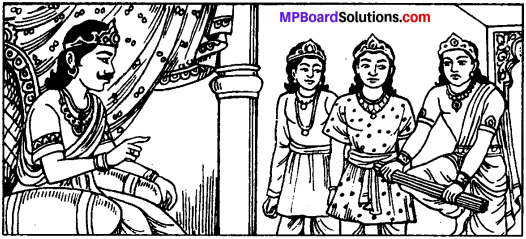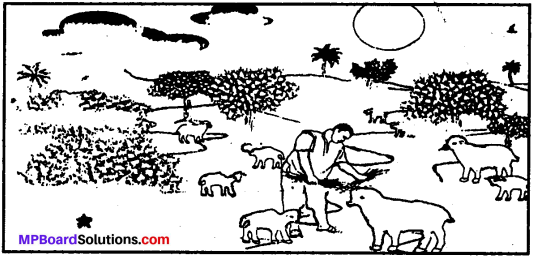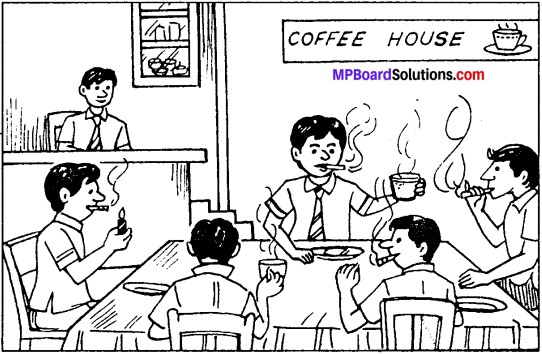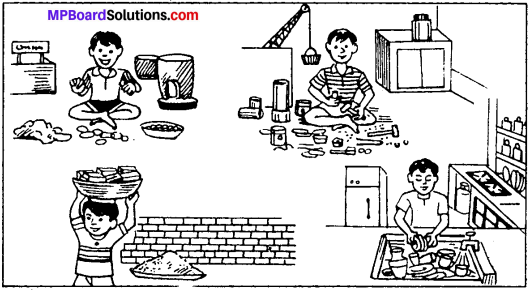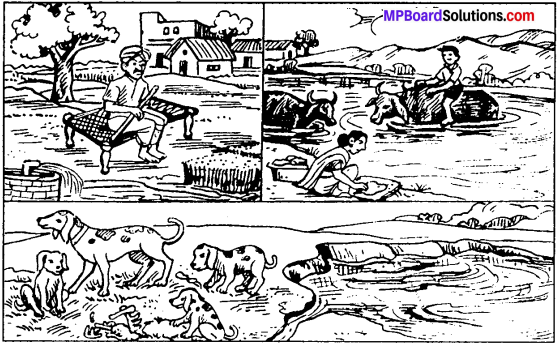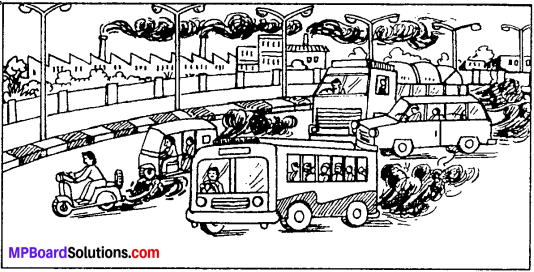Students who are studying 11th can get the free Madhya Pradesh Board Solutions for 11th English Chapter 3 My Mother Questions and Answers PDF here. You can download MP Board Class 11th English Solutions Questions and Answers PDF on this page. Practice questions of Mp Board Solutions of 11th English subject as many times as possible to get good marks.
MP Board Class 11th English A Voyage Solutions Chapter 3 My Mother (Nirad C. Chaudhuri)
Gather chapter wise MP Board Solutions for 11th English Study Material to score the highest marks in the final exam. Various chapters and subtopics are given clearly in MP Board Class 11th English Solutions Chapter 3 My Mother Questions and Answers Material. All the MP Board Solutions for 11th English Questions with detailed answers are provided by subject experts. The step by step MP Board Class 11th English Chapter 3 My Mother Questions and Answers guide will help you to enhance your skills in English subject and grammar. Here, along with the subject knowledge, grammar knowledge also plays an important role. So, students should download MP Board Solutions 11th English and read it to attempt all the questions with 100% confidence.
My Mother Textual Exercises
Word Power
(a) The first word in each pair below is used in the text. The second is almost similar in sound but different in meaning- for example: Complement – My parents are complementary to each other. Compliment (generally in plural) Pay my compliments to your parents, Now give the meanings of the following pairs of words and use them in sentences as above:
Plain – plane/dissent – decent/quite – quiet/access – excess/accept – except
Answer:
- Plain – a large area of level country – We live in plains,,
- Plane – aeroplane – I usually travel by plane.
- Dissent – disagree – Those who dissented with the organisation formed another part}’
- Decent – fine – nice – Her dress is always decent.
- Quite – His character is quite good
- Quiet – He is cool and quiet by nature.
- Access – approach – I have an easy access to the principles.
- Excess – more than – Excess of anything is bad.
- Accept – agree – Accept my hearty congratulations. please.
- Except – to leave out – All except Mohan were present.
(b) Many words are the same in noun and verb forms:
- Cook (verb) – Mother is cooking food in the kitchen.
Cook (noun) — Our cook has not come today. - Now use the following words as above:
answer. change, love, display, ripple, glance. produce. face. groan. knock, smile - Answer (verb) — I answered all the questions.
Answer (noun) — The teacher was pleased with my answer. - Change (verb) — I have changed my ways.
Change (noun) — My mother does not like to bring an change in her life style. - Love (verb) — All the teachers love Aakash.
Love (noun) — I have great love for my country. - Display (verb) — Several items were displayed in the exhibition.
Display (noun) — 1 made a display of my art. - Ripple (verb) — Water rippled on the floor.
Ripple (noun) — There were ripples of water. - Glance (verb) — I glanced at him with a smiling face.
Glance (noun) — He gave a quick glance at me. - Produce (verb) — The factory produces several articles
Produce (noun)— The produce of the land is not good. - Face (verb) — I have faced many difficult situations in my life.
Face (noun) — The baby’s face is cute, - Groan (verb) — The patient is groaning.
Groan (noun) — The groan of the patient awakened me. - Knock (verb) — Someone knocked at the door.
Knock (noun) — He gave a massive knock at the door. - Smile (verb) — The child is smiling sweetly.
Smile (noun) — He made everyone happy with his sweet smile
(c) Given below are some compound adjectives. Write them with their definitions. Match the words with their meanings.
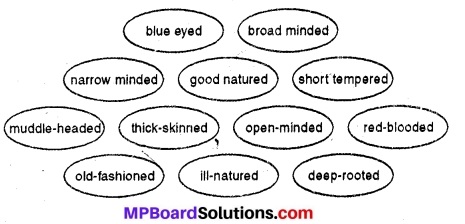
Answer:
- someone ho gets angry very easily short tempered.
- a very tolerant person broad — minded.
- an intolerant person narrow — minded.
- a person with a pleasant generous character good — natured.
- a person treated with special favour blue — eyed.
- a person who is confused muddle — headed.
- someone who is willing to listen open — minded.
- It belief s difficult to change deep — rooted.
- someone ho does not behave well or politely ill — natured.
- someone,something not modern old — fashioned.
- someone full) of strength and energy red—blooded.
- a person who does not easily get upset b criticism thick — skinned.
Now use the adjectives in sentences of your own.
Use the above adjectives in sentences
- shorttem Pered: No one likes a short-tempered person
- broad-minded: My uncle is a broad—minded person
- blue-eyed: He is the principal’s blue eyed student.
- good natured: My mother is a good—natured lady
- narrow minded: We should keep a distance with narrow— minded people.
- muddleheaded: I am totally muddle—headed.
- open-minded; Every one loves and respect an open—minded person
- deep-rooted: I can’t change the deep—rooted beliefs within me
- ill-natured: An ill—natured man can do nothing good to anyone.
- old-fashioned: My parents are old—fashioned about marriages.
- red.blooded: Alway is a red—blood boy.
- thick-skinned: M lather is a thick—skinned man
(A) Comprehension
(a) In temperament and outlook the writer’s parents were:
(i) similar
(ii) reverse
(iii) almost common
(iv) almost opposite.
Answer:
(ii) reverse
(b) How does the author describe his mother’s chin?
(i) as being attractive
(ii) as being repulsive
(iii) as being regular and prominent
(iv) as being proportionate to the upper part
Answer:
(iv) as being proportionate to the upper part
(c) The author’s mother was intolerant of demonstrativeness
(i) more than his father was
(ii) as much as his father was
(iii) as much as the writer was
(iv) not even in the least.
Answer:
(iv) not even in the least.
(d) The writer’s mother was
(i) like all Indian mothers
(ii) like a few Indian mothers
(iii) like most Indian mothers
(iv) unlike Indian mothers.
Answer:
(ii) like a few Indian mothers
(e) ‘Bad manners’, according to the sihor’s mother, were
(i) acceptable in children
(ii) against social behaviour and charity
(iii) tolerable to some extent
(iv) not acceptable in high society.
Answer:
(ii) against social behaviour and charity
(B) Answer the following questions in one sentence each:
Question 1.
In what way were the parents of the writer complement of each other?
Answer:
If one chooses to say the same thing in a different way, they were the complement of each other.
Question 2.
Which simile does the writer use for the ripping face of his mother?
Answer:
As responsive as?
Question 3.
Where were the two deep wrinkles formed in his mother’s face?
Answer:
There were the two deep wrinkles between her eyebrows.
Question 4.
What produced the wrinkles on her forehead?
Answer:
The frequent fits of introspective brooding into which she fell produced the wrinkles on her forehead.
Question 5.
How does the author describe his mother’s eyes and nose?
Answer:
As the author describes, his mother’s eyes were large and liquid and her nose was very regular and prominent.
Question 6.
What was the mother’s concept of ‘good manners’?
Answer:
Good manners were a matter of fundamental decencies and not of external polish.
(C) Answer the following questions in 30 to 40 words:
Question 1.
In what way were the parents of the writer reverse of each other?
Answer:
The writer’s mother was completely reverse to his father. Appearance, temperament and outlook-nothing was similar to that of each other. While the mother was slight and fragile, father was robust. Mother’s face was responsive whereas the father’s was impassive. Mother was more intolerant of demonstrativeness than father.
Question 2.
Describe the author’s mother’s face in your own words?
Answer:
As the writer says his mother’s appearance was not at all good and impressive. She had two deep vertical wrinkles between her eyebrows. Her forehead was very well-shaped without being high. Her face was oval and broad. Her eyes were large and nose was very regular and prominent.
Question 3.
How will an average Indian mother react to an accident with her child?
Answer:
An average Indian mother will react very quickly to an accident with her child. She would be very panicky. If a one year old baby falls down from, a height, the mother would give a hideous scream and begin to knock her head on the floor by way of mourning assuming that the child was already dead.
Question 4.
How did the writer’s mother react to a mishap with him?
Answer:
The writer’s mother had the capacity to restrain herself soon even if an accident happened with her child. Even in her worst panic she never went any where for help.
Question 5.
What faults of character did the mother dislike?
Answer:
The mother often disliked the faults of character like falsehood, dishonesty, moral cowardice and meanness. She always condemned vice and despised the tacit acceptance of an advantage.
Question 6.
What is meant by expression ‘a sharp and biting tongue’? How did author’s mother react to his sharp and biting tongue?
Answer:
‘A sharp and biting tongue’ means talking in an ill-mannered. It was against the code of social behaviour and charity also. The mother never allowed her children to be ill-mannered. She thought it to be a way of under dog.
(D) Answer ,the following questions in about 150 words:
Question 1.
Narrate in short the physical features of the writer’s mother.
Answer:
The writer explains the physical features of his mother in detail. The mother was not very handsome. She was slight and fragile with a responsive face. She had two wrinkles between her eyebrows. Her forehead was very well-shaped. It was not very high. Her face was oval. It was broad in its upper half but very quickly receding and tapering in the lower. She had large eyes Her nose was very regular and prominent. She had well cut lips which tended towards fullness in the lower one. Her chin was remarkable for being neatly shaped but not weighty enough for-the upper part. On the whole, the writer says, mother’s features reflected an impression of unsleeping alertness and in exhaustible animation.
Question 2.
How were the appearances of the mother deceptive?
Answer:
The mother’s appearance was deceptive. The first place she had two deep vertical wrinkles between her eyes which was normally believed to be a sign of a bent for thought. But the mother was not intellectual. But she was argumentative and devastatingly logical. She always appeared to be in a thoughtful mood. Secondly, her face never indicated the immense strength of her moral conviction. No one could ever guess from her face that she was almost fanatic over the questions of right and wrong. She was always intolerant of demonstrativeness but she was never too much emotional. Still she had motherly instinct and controlled the situation at her own.
Question 3.
Prove by giving an example how the mother hated tacit acceptance of advantage?
Answer:
The mother’s character has been dealt with all minute details. Mother was very strict in dealing with her children. She never liked false hood, dishonesty, moral cowardice and meanness. She always condemned vice and almost equally despised the tacit acceptance of an advantage. The writer gives instance from his life experience. He says if mother asked them to take a portion after dividing a sweet or some other dish, they always requested her to give them the piece herself. It was because, the writer says, if by any chance one of them took a piece thinking to be bigger, mother would look at him with a meaning smile or at times even angry contempt.
Question 4.
Write a short essay on ‘Good Manners’?
Answer:
Good manners make a man complete. They are very essential for human civilization. Without good manners, man is like a purse without money though it is very attractive from outside. They are the outcome of good breeding.A person who has been brought up in a good environment must have good manners. You may call them flowers of mankind’s garden.
One should be sympathetic towards weak and old. We should speak gently. Even if any one is harsh to us, we should not use harsh words at all costs. We should give up evil thoughts for all time to come. Harshness is a sign of smallness and shallowness. It makes a man unpopular.
We should be humble and polite. Politeness costs nothing. It can win us many friends. Sweet words are essential for success in life. We should neither brag or boast. We should be obedient to our parents and teachers. We should be industrious. We should be ready to help the needy. We should show courtesy to everyone. We should talk as much as is necessary. Thus, good manners are very important for the all round development.
Question 5.
Give a general impression of the writer’s mother as you gather from the lesson?
Answer:
The writer’s mother was a unique character. She Was a complete contrast from her husband. She differed with him in appearance, temperament and outlook. Her face was responsive .while that of the father was impassive. She was not at all handsome. Her face had some remarkable features which gave an impression of unsleeping alertness and inexhaustible animation. Nobody had ever called such a face as a face of simple and honest goodness.
She was intolerant of demonstrativeness but she had known how to control one’s emotion. She was never so panicky as usually as average Indian mother became. She never looked falsehood, dishonesty, moral cowardice and meanness. She always condemned vice and despised the tacit acceptance of an advantage. She never liked bad manners. She had disciplined her children perfectly.
Question 6.
Point out the likes and dislikes of Nirad C. Choudhury, as they emerge from the text.
Answer:
Nirad C. Choudhury was a prolific writer. The autobiography of ‘An Unknown India’ was his first English work. ‘My Mother’ is an excerpt from this famous autobiography. He, here, gives a pen-portrait about his mother. In the meantime he also gives some information about his likes and dislikes. He likes to be cared with motherly emotion. He also likes mother’s love. Though he loves his mother, he does not like the business like attendance on children in sickness by his mother. He likes his mother is strong character and strict discipline. But he does not like so much strictness at every step. He wants some liberality in his behaviour. He doesn’t like many traits of his mother still he loves her for she had given him a strong character and perfection of life.
Grammar
(i) Learning Modals
Look at the underlined portions in the following sentences from the text:
(a) No one could have inferred from her face that she was capable of such fanaticism.
(b) Being a high strung woman, she was capable of turning panicky.
(c) Yet we could not always chasten ourselves to take the most patently superior piece.
(d) The fault which my mother emphasized was the manners of behaving in a fashion which might wound the susceptibilities of those who had come to our house in friendliness.In the above sentences, “could” and “might” are not auxiliaries of tense. They are modals, which express certain modals of verb attached with them. In these sentences the phrase ‘was capable’ of shows a modality of ‘could’.
Modalities expressed by can, could, may, might, are given below:
Can:
(a) ability, capacity, power
Example: I can fly a kite now.
A manager can hire and fire his subordinates.
(b) permission to the subject.
She can now begin her work.
(c) expressing disbelief or impossibility (in interrogative or negative) Can it be! No, he cannot be defeated.
Could:
(a) past ability, capacity, power, not existing now’
I could speak French when I was in France.
(b) permission in the past with suggestion of charged condition.
He could order anybody when he was a collector.
(c) unreal past (non-fulfillment of an action)
I could have gone to England long ago.
May:
(a) seeking permission (through interrogative sentence)
May I attend your lecture?
(b) future possibility
The things may go wrong as you are not cautious about your business.
(c) expressing goodwill, blessing May all of you prosper well.
(d) expressing purpose (with conduction ‘so that’ with verb in the present tense. With a past tense verb in the principal clause, ‘may’ in the subordinate clause is replaced by ‘might’. She always takes precaution so that her boss may not chide her.
Might:
(a) doubtful possibility (may be or may not be) refers to present possibility.
He might be a foreigner, I believe.
(b) non-fulfillment of a possibility in the past (use might have +- verb past participle)
I might have became a millionnaire, if I had won the lottery.
Given below are sentences with can, could, may and might. Find the modality expressed in each case and write it in your notebook.
1. He could fly an aeroplane when be was young.
2. I cannot speak Marathi fluently.
3. Take a shorter route so that we may be in time.
4. May you have a happy journey!
5. It is chilling cold, you may catch cold.
6. Look! She might be your friend Rita.
7. The patient might have collapsed. Thank God, he survived the operation.
8. You can have all my books. Now 1 don’t need them.
9. Can he be such a liar! I don’t believe.
10. I could have passed the exam.
Answer:
- Past ability, not existing now.
- Expressing impossibility.
- Future possibility,
- Expressing goodwill, blessing
- Future possibility
- Doubtful possibility.
- Expressing goodwill, blessing
- Permission to the subject
- Expressing disbelief
- Unreal past (non-fulfillment of an action).
Given below are some idiomatic expressions with their meanings. Learn their meanings and use them in sentences of your own. (The first one is from the text of the lesson).
1. wearing one’s heart on one’s sleeve-making known one’s feelings easily.
2. to have no heart-to have no capacity for feeling emotions
3. to take heart-to have courage or enthusiasm
4. change of heart-change of attitude towards something miking more friendly
5. heart of the matter-essence, innermost part of something
6. at heart-in one’s innermost feeling
7. to,break a person’s heart-overwhelm a person with sorrow
8. by heart-from memory
9. give one’s heart to/lose one’s heart to-to fall in love
10. not to have the heart to-to be insensitive
11. take to heart-be much affected by
12. to one’s heart’s content-as much as one wishes to have
13. with all one’s heart-sincerely, with all goodwill
14. heart-to heart-intimate conversation etc
15. after one’s own heart-according to one’s desire or feeling
16. heart burning-jealousy.
Answer:
- It is not a good sing to wear one’s heart on one’s sleeve.
- He had no heart to console the death of his friend’s mother.
- Netaji took heart to challenge the great British Empire.
- A sudden change of heart transformed the situation.
- Tire heart of the matter is that today everything has turned to be a business
- My mother is a high devotional at heart.
- The student broke a teacher’s heart with bad performance.
- I learnt my by heart
- Don’t lose your heart to an undeserving person.
- I have always suggested him not to have the heart to anyone.
- I was .taken to heart by my neighbour.
- Every one wants his son to be achieve the height of success of his heart’s content.
- I have prepared for this exam with all my heart.
- Vajpayee held a heart to heart discussion with Mussaraf.
- One can get success after one’s own heart by working hard.
- My rise has always been a cause of heart burning for my neighbour.
Speaking Activity
Question 1.
Face is not the index of man. One may be high strung and following in the face but the heart may be full of milk of human kindness. The other may have captivating looks but there might be a sting behind them.
Divide the class in 5 groups and ask them to deliberate over the statement. Then the leader of each group will share the conclusions arrived at by his group with the class. Finally the teacher will conclude, the discussion.
Answer:
to be discussed at the class level.
Question 2.
Discuss the usefulness of good manners with h friend of yours and write out the conclusions;
Answer:
Good manners are the features that make one popular in society. If one applies them with a friend one will make a strong friendship. The friend will always stand with him at even step even in the bad days. He always proves a friend in need is a friend indeed Such a friendship will help each other solving any difficult situation with sincere cooperation Good manners can win friends and help one achieve all success.
Writing Activity
Question 1.
You are a student at Govt. Higher Secondary School, Narsinghpur and are living in the school’s hostel. your mother had given you a lot of advice regarding your behaviour with the inmates before you left for joining the school.Write down all the points of importance as guidelines for your class-mates.
Answer:
I am a student Govt Higher Secondary School. Narsinghpuri live in the schools hostel It joined this school just a few months ago. Today I am very popular among my classmates and other school children. I know the secret of this popularity when I was join this school, my mother gave me some advice I still remember them and work accordingly. Some of these, advices are
- I Always behave politely
- Don’t speak roughly
- Help your friends
- Regard your seniors
- Love your juniors
- Treat your teachers like your father
- Study sincerely
- Be regular and punctual
- Follow the school routine strictly
- Always be neat and clean.
Think It Over
Ponder over the following and write down some points on each topic and share with your class.
1. An incident which shows your mother’s kind nature.
2. Your duty towards your mother
3. Things you would like to improve in your nature for her sake
Answer:
For self attempt . The lesson is an extract from the writer’s autobiography, published in 1951 under the title “The Autobiography of an Unknown Indian.” An autobiography is the story of a person’s life written by himself. It results from the writer’s pondering over his own ‘selfs, his thoughts and actions, his achievements and failings, in a word, his inner life as well as ‘ his public career.
Match the writer given under (A) with his/her autobiography given under(B)
| A | B |
Jean Jacques Rousseau | My Experiments With Truth |
Answer:
| A | B |
| Jean Jacques Rousseasu Kamla Das Mahatma Gandhi A.P.J. Kalam Jawaharlal Nehru Maulana Abul Kalam Azad | Confessions My Story My Experiment With Truth Wings of Fire Autobiography India Wins Freedom |
My Mother Summary in English
‘My mother” is an excerpt from the autobiography of Nirad C, Chaudhuri, Here he lays stress on the distinctive feature and convictions of his mother who is unlike average Indian mothers. She is in no way a suitable match for his father for being a complete contrast to appearance, temperament and outlook. On the one hand, mother is slight and fragile, on the other, father is robust. Similarly, mother’s face is as responsive as his father’s is impassive She is always vivid and highstrung. Her face appears to be thoughtful which she is not at all.
She is not handsome. Her forehead is well-shaped. Her face is oval and board. Her eyes are large and nose very’ regular and prominent, lips well-cut. Her chin is remarkable for being neatly shaped but not weighty enough for the upper part. On the whole, her features give an impression of unsleeping alertness and in exhaustible animation. Her appearance is always deceptive because it doesn’t show what she is. Her moral convictions are very strong.
She is almost fanatic over the questions of right and wrong. She is intolerant of demonstrativeness. She hardly conceals her emotions. She gets excited very soon. But she has the capacity unlike an average Indian mother to control herself with out being panicky. The luxury of self-pitys well as sympathy is severely at control in her house.
She doesn’t like the faults of character like-falsehood, dishonesty, moral cowardice and meanness. She condemn vice and despises the tacit acceptance of an advantage. The writer cities two examples to clarify it. He says if mother puts pieces of sweet before them, they would always ask her to give the piece to them by herself. It was because if anyone takes the bigger piece she would always be angry. The other instance of the writer’s hostel. In the hostel the boarders living nearer to the dining hall at the advantage of getting their meal earlier for the dining-hall was not large. The students living upstairs used to come down silently taking their shoes in hand in order to get their chance earlier silently. The writer says that it was the strict guidance of his mother that never allow him to take such advantage. He says that he always felt that wait for one’s turn was always justified.
The other thing that the writer has learned from his mother is that good manners are always a matter of fundamental decency and not of external polish. The children in his house never whispered or laughed in the presence of visitors. If anyone did it innocently even then he was severely dealt with after ward’s. Bad manners for her were a sin not merely against a code of social behaviour but against charily’. The writer concludes that his mother has always been a guiding force in his life.
My Mother Summary in Hindi
‘My Mother’ नीरद सी. चौधरी की जीवनी का एक अंश है। यहां वे अपनी माँ, जो सामान्य भारतीय माताओं से भिन्न है, की विशेषताओं और मान्यताओं का उल्लेख करते हैं। वह किसी भी तरह उसके पिता के लिए सटीक जोड़ा नहीं है क्योंकि हाव-भाव, मनोदशा एवं बाहरी दिखाया में वह उनके बिल्कुल विपरीत है। एकतरफ माँ बिल्कुल दुबली-पतली है, तो दूसरी ओर पिता काफी हट्टे-कट्टे हैं। उसी तरह माँ का चेहरा आतुर जैसा दिखता है, वहीं पिता का चेहरा बिल्कुल भावशून्य। यह हमेशा क्रियाशील एवं भावावेग में रहती है। उसका चेहरा हमेशा विचारमग्न लगता है जबकि वह ऐसा बिल्कुल ही नहीं है। ”
वह सुन्दर नहीं है। उसके ललाट सुगढ़ हैं। उसका चेहरा अंडाकार और चौड़ा है। उसकी आँखें बड़ी हैं और नाक बहुत ही उभरी हुई है। उसके ओठ अच्छे हैं। इसकी ठुड्डी अच्छी बनावट और. ज्यादा भारी न होने के कारण उल्लेखनीय है। कुल मिलाकर उसकी विशेषताएं एक ठनिंद चेतना और अथक जीवन का आभास देती हैं। उसके हाव-भाव हमेशा ही छलावायुक्त लगता है, क्योंकि यह वैसा नहीं दिखाता जैसी वह वास्तव में है। उसकी नैतिक बाध्यताएं काफी मजबूत है। सही और गलत के मुद्दे पर वह बिल्कुल कट्टर है। बाहरी दिखावा उसे बिल्कुल पसंद नहीं है। वह अपनी भावनाओं को मुश्किल से छिपा पाती है। वह शीघ्र ही उत्तेजित हो जाती है। लेकिन एक सामान्य भारतीय माँ के विपरीत उसमें अपने आप को बिना आतंक महसूस किए नियंत्रित करने की क्षमता है। निरीहता और सहानुभूति का सुख उसके घर में बिल्कुल नियंत्रित है।
वह झूठ, बेईमानी, नैतिक गिरावट तथा ओछापन जैसे चारित्रिक दुर्बलताओं को पसंद नहीं करती। वह दुष्टता को धिक्कारती है और अवसर का गलत उपयोग या फायदा उठाने का विरोध करती है। लेखक इसे स्पष्ट करने के लिए दो उदाहरण देता है। वह कहता है कि यदि माँ मिठाई के टुकड़े उनके सामने रखती है, तो वे उसे न उठाकर माँ से देने का अनुरोध करते हैं। ऐसा वे इसलिए करते है क्योंकि अगर कोई मिठाई का बड़ा टुकड़ा खुद ले लिया तो माँ नाराज हो जाएगी। दूसरा उदाहरण लेखक के छात्रावास के बारे में है। छात्रावास में भोजन-कक्ष के साथ रहने वाले छात्रों को यह सुविधा थी कि उन्हें भोजन जल्दी मिल जाता था क्योंकि भोजन-कक्ष बहुत बड़ा नहीं था। ऊपरी मंजिल पर रहने वाले छात्र अपने जूतं हाथ में लेकर चुपचाप नीचे आ जाते थे जिससे उन्हें भोजन जल्दी मिल जाए। लेखक कहता है कि यह उसकी माँ का सख्त निर्देश था जिसने उसे ऐसा फायदा उठाने की आज्ञा नहीं दी। वह कहता है कि उसे हमेशा महसूस हुआ कि अपनी बारी का इंतजार करना हमेशा न्यायसंगत होता है।
दूसरी चीज जो लेखक अपनी माँ से सीखा वह है कि अच्छा आचरण हमेशा मौलिक शालीनता है न कि बाहरी दिखावा। उसके घर के बच्चे कभी भी किसी अतिथि के सामने आपस में न कानाफूसी किए और न ही हँसे। यदि किसी ने अनजाने में भी ऐसा किया तो उसके साथ बाद में सख्त व्यवहार होता था। उसके (माँ) लिए बुरा आचरण एक पाप की तरह था जो न केवल सामाजिक आचरण के खिलाफ था बल्कि उदारता के भी विपरीत था। लेखक निष्कर्ष निकालता है कि उसकी माँ उसके पूरे जीवन में एक मार्गदर्शक की तरह रही।
My Mother Word Meaning
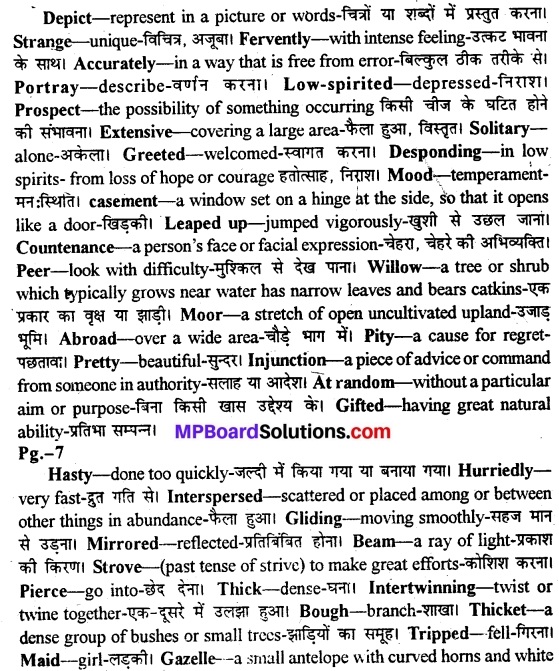
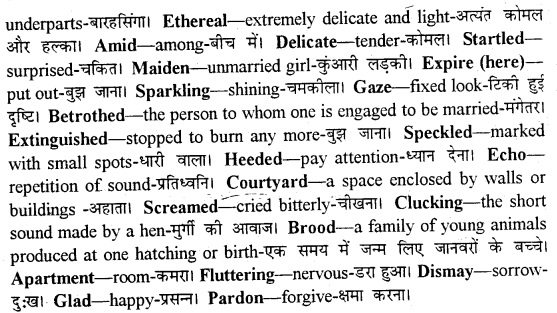
My Mother Comprehension
Read the following passages and answer the questions that follow:
1. My father and mother were bound to each other by certain common principles and standard of conduct, but otherwise, in appearance, temperament, and outlook, they were the reverse or, if one chooses to say the same thing in a different of each other. My mother was as slight and fragile as my father was robust, while her face was as responsive as my father’s was impassive.
Questions:
(i) Who is the narrator in these lines?
(ii) How was the narrator’s father bound to his mother?
(iii) Why does the narrator find his mother not a suitable
match for his father?
(iv) What does the face of the father a contrast to that of the mother?
(v) Give a word similar in meaning to the expression ‘lean and thin’?
Answers:
(i) The writer is the narrator of these lines.
(ii) The narrator s father was hound to the mother by certain common principles and standard of conduct.
(iii) The narrator finds his mother not a suitable match for his father because she is a complete contrast in appearance. temperament and outlook of the father.
(iv) The mothers face was responsive while the father’s was impassive.
(v) ‘slight and fragil
2. But here again the appearances were deceptive, for her face did not show. hardly indicated even, the immense strength of her mpral convictions. No one could have inferred from her face that she was capable of such fanaticism as she showed over questions of right and wrong. Even more than my father was she intolerant of demonstrativeness and the wearing of one’s heart on one’s sleeve.’
Questions:
(i) Whose face is deceptive?
(ii) Why does the writer say her face deceptive.
(iii) What fanaticism does the writer refer to here?
(iv) Find a word opposite in meaning to ‘liberallcm’?
Answers:
(i) The mother face is deceptive.
(ii) The writer calls the face deceptive because it does not show what she really is.
(iii) Fanaticism here refers to the strictness of mother towards the questions of might and wrong.
(iv) ‘Fanaticism.
3. The faults of character she disliked most were falsehood, dishonesty, moral cowardice and meanness.
A liar, a cheat, a coward, and a personith the tiny heart of a minnow” as she put it were the most contemptuous epithet we heard From her mouth. Not only did she condemn vice, she almost equally despised the tacit acceptance of an advantage.
Questions:
(i) What faults of character did the mother not like?
(ii) Whose heart is as tiny as that of a minnow?
(iii) hat did She condemn and despise?
(iv) Pick out words from the above stanza which are opposite in meaning in
(a) brave
(b) huge
(c) virtue
Answers:
(j) The mother did not like falsehood. dishonesty, moral cowardice and meanness.
(ii) The heart of a liar, a cheat and a board is as tiny as that of a minnow.
(iii) She condemned vice and she despised the tacit acceptance of an adantage.
(iv)
(a) coward
(b) tins
(c) vice
Above provided complete MP Board Solutions 11th English Study guide is useful for making your preparation effective. Students can frequently visit our page to get the latest updates on other subjects study materials.
